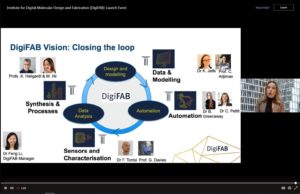The MSDE Editorial Office was delighted to attend the virtual launch event for Imperial College London’s new Institute for Digital Molecular Design and Fabrication (DigiFAB) last month on Tuesday 18 May.
DigiFAB is a unique new institute dedicated to digital molecular design and fabrication. The institute is a key priority of Imperial College London’s Academic Strategy and it is a flagship project working across all faculties and departments. DigiFAB’s vision is to transform chemical design, discovery and manufacturing by moving away from slow, labour-intensive manual methods, to highly automated, data-driven approaches that capitalise upon advances driven by the Fourth Industrial Revolution and work with both academic and industrial partners. The Institute is underpinned by four research pillars: Automation; Data and Modelling; Synthesis and Processes; and Sensors and Characterisation Platforms.
The launch event began with opening remarks by Professor Ian Walmsley FRS, Provost of Imperial College London followed by an introduction to the vision of the Insitute by the director of DigiFAB Professor Sophia Yaliraki. This was followed by a talk by Alex Broomsgrove, Head of Advanced Materials at the EPSRC, about Advanced Materials in the Research Funding Landscape.

DigiFAB director Professor Sophie Yaliraki outlines the strategic vision for the Institute, including the Imperial College London researchers involved in the Insitute and their respective areas of expertise
The first contributed scientific talk of the event entitled “Computers and automated synthesis, learning to work together to accelerate porous material discovery” was given by DigiFAB leads Dr Kim Jelfs and Dr Becky Greenaway (Check out their MSDE paper from last year entitled “Computational screening for nested organic cage complexes“)
After a short break, the Keynote talk entitled “Universal Synthesis Machines and Chemputation” was delivered by Prof. Lee Cronin FRSE, FRSC (Regius Chair of Chemistry, University of Glasgow). This was followed by a talk by Professor Donna Blackmond (The Scripps Research Institute and Chair of the DigiFAB External Advisory Board) entitled “Vision 2030: Opportunities and Challenges for Data-Rich Chemistry“. The event was then ended with closing remarks made by Professor Oscar Ces, Head of the Department of Chemistry at Imperial College London.

Professor Donna Blackmond from the Scripps Institute giving her talk entitled “Vision 2030: Opportunities for Data-Rich Chemistry”. Professor Blackmond is also an Editorial Board member of RSC sister journal Reaction Chemistry & Engineering.
If you were unable to join the launch event, you can watch the event on the Imperial College London YouTube Channel. For the full launch programme, speaker information as well as further information about the DigiFAB launch please visit: https://www.imperial.ac.uk/events/132630/institute-for-digital-molecular-design-and-fabrication-digifab-launch-event/
You can subscribe to the DigiFAB mailing list and follow them on twitter @ImperialDigiFAB to hear about all their upcoming news and activities.
—
Check out the RSC’s recent Digital Futures report, which sets out to provide a more in-depth understanding of the long-term promise of and concerns about the use of data and digital technologies for scientific discovery.











